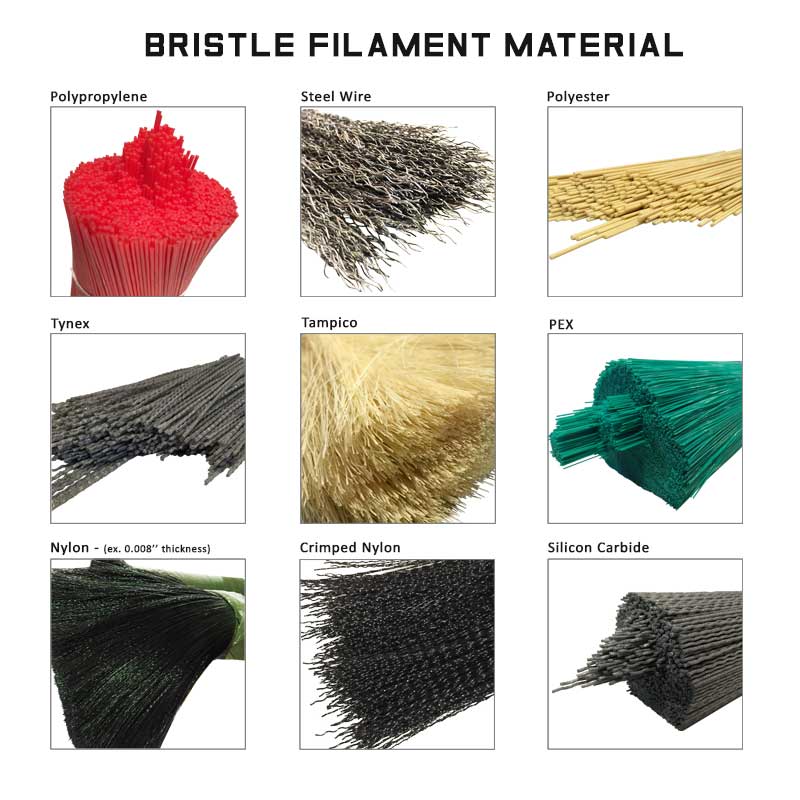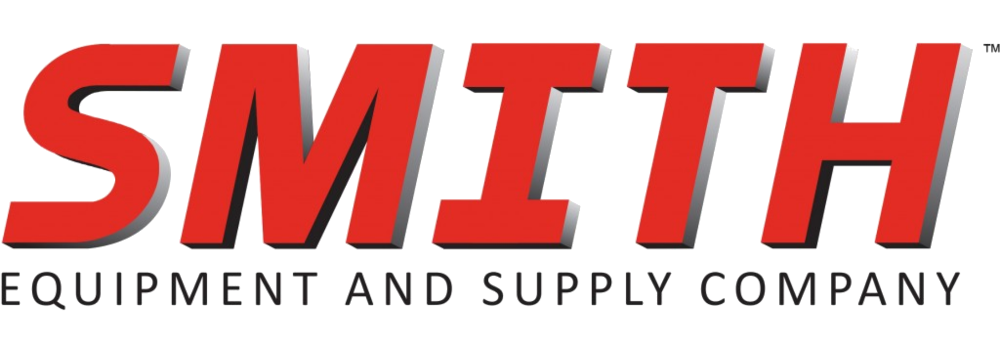Brush Filament Chart
When you have a heavy duty application for resurfacing roads or cleaning industrial tools, you need to find the right brush material for the job. Using a softer bristle may add flexibility to your sweeper brush, but it will also cause it to wear out sooner. With industrial sweeper brushes, we match the application to the specified bristle material. If you’re not sure which bristle material is recommended for your job, ask our expert team and we’ll verify it for you! Don’t settle for the wrong bristle! Smith Equipment will work with you to ensure you find the right bristle material for your sweeper brush every time.


Brush Filaments and Their Applications
Polypropylene is the industry standard for all street sweeping and rotary sweeper brushes. Polypropylene has good rigidity and memory compared to other filament types. A bristle’s memory is related to how easily it will take its original shape after use.
Steel Wire is also used to help aid abrasion and frictional power of the broom. Steel wire is typically used in tandem with our polypropylene bristles which adds to the lifetime of the poly bristles and adds to the brooms cleaning ability by sweeping and scrubbing heavier pieces of debris with its steel wire.
Polyester is a softer plastic used in special applications, like trommel brushes.
Tampico is an organic fiber made typically from coconuts that is more widely used in cleaning applications for produce like oranges and tomatoes. PEX is known for its softer features. Made from Polyethylene, it is a mix of plastic polymers and ethylene gas. Due to its softer aspects, this bristle will not cause abrasions when in use and is ideal for cleaning produce and other pressure sensitive applications.
Nylon is a slightly weaker plastic due to its manufacturing process. Nylon is formed through the molecular condensation where small molecules are emitted during the chemical joining process as waste. Polypropylene is an addition polymer where all molecules in the reaction are rearranged to form a stronger, more useful compound. There are no waste molecules in the manufacturing of polypropylene.
Nylon however can be stretched into a smaller, thinner filament without breaking. It has greater malleability and can be used in specialized applications where a polypropylene bristle is too rigid or large.
Tynex – This is a highly specialized and heavy duty filament that is comprised of nylon and abrasive ceramic grit. This particular bristle is idea for finishing metal products as it is guaranteed to contain no iron or steel for finishing purposes.
Silicon Carbide – The strongest of strong, this particular material is extremely hard and is designed to outlast any other bristle filament in abrasive applications. The main silicon material is include with carbon grit.
Steel Wire is also used to help aid abrasion and frictional power of the broom. Steel wire is typically used in tandem with our polypropylene bristles which adds to the lifetime of the poly bristles and adds to the brooms cleaning ability by sweeping and scrubbing heavier pieces of debris with its steel wire.
Polyester is a softer plastic used in special applications, like trommel brushes.
Tampico is an organic fiber made typically from coconuts that is more widely used in cleaning applications for produce like oranges and tomatoes. PEX is known for its softer features. Made from Polyethylene, it is a mix of plastic polymers and ethylene gas. Due to its softer aspects, this bristle will not cause abrasions when in use and is ideal for cleaning produce and other pressure sensitive applications.
Nylon is a slightly weaker plastic due to its manufacturing process. Nylon is formed through the molecular condensation where small molecules are emitted during the chemical joining process as waste. Polypropylene is an addition polymer where all molecules in the reaction are rearranged to form a stronger, more useful compound. There are no waste molecules in the manufacturing of polypropylene.
Nylon however can be stretched into a smaller, thinner filament without breaking. It has greater malleability and can be used in specialized applications where a polypropylene bristle is too rigid or large.
Tynex – This is a highly specialized and heavy duty filament that is comprised of nylon and abrasive ceramic grit. This particular bristle is idea for finishing metal products as it is guaranteed to contain no iron or steel for finishing purposes.
Silicon Carbide – The strongest of strong, this particular material is extremely hard and is designed to outlast any other bristle filament in abrasive applications. The main silicon material is include with carbon grit.

